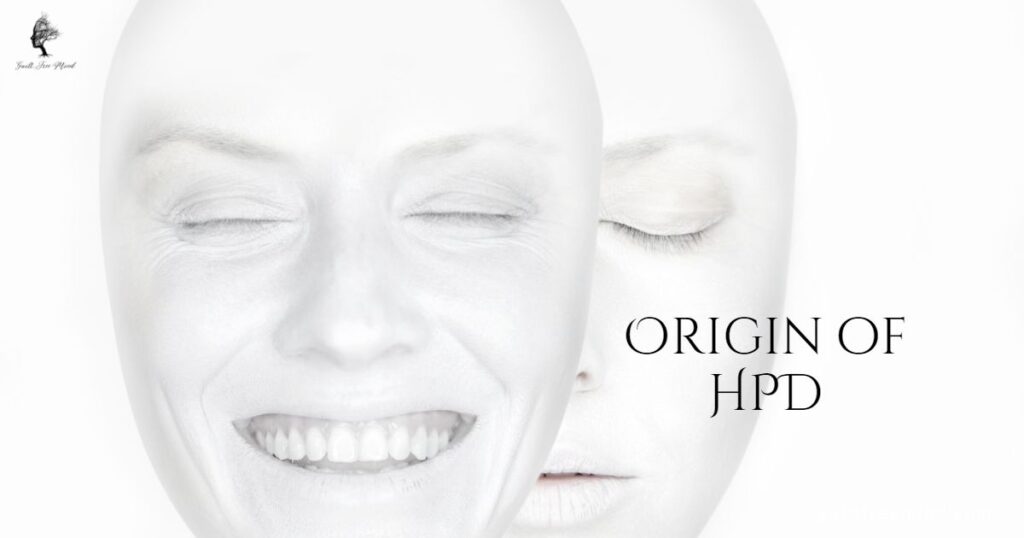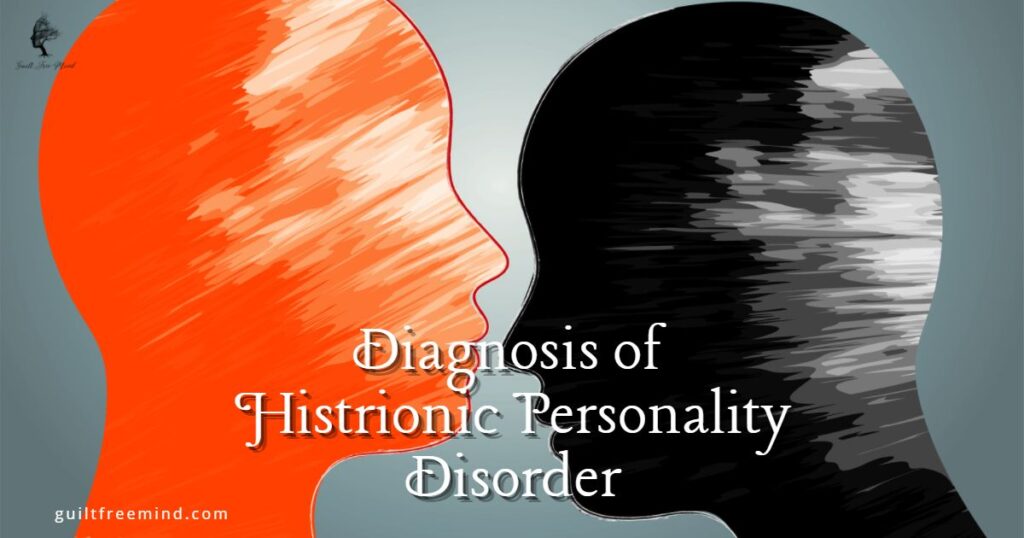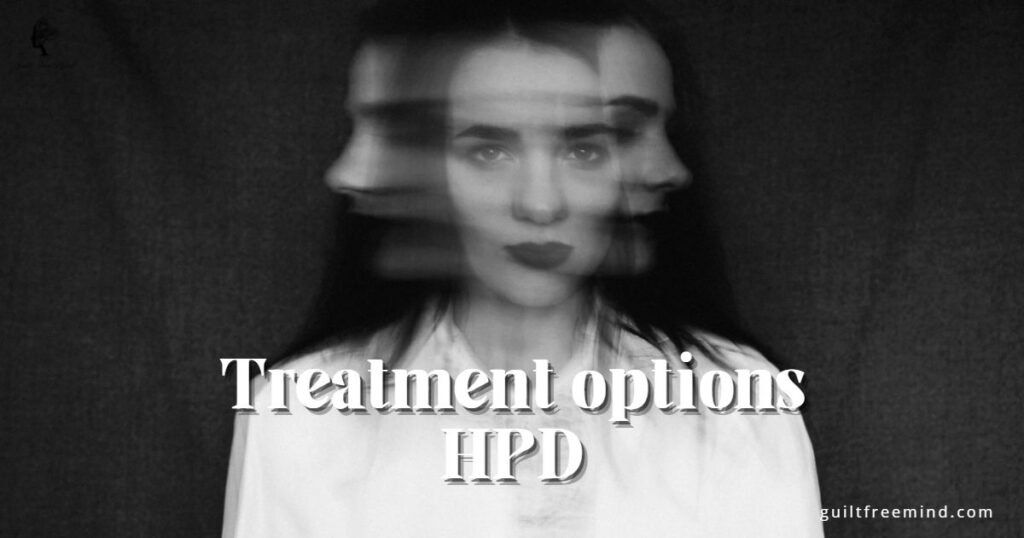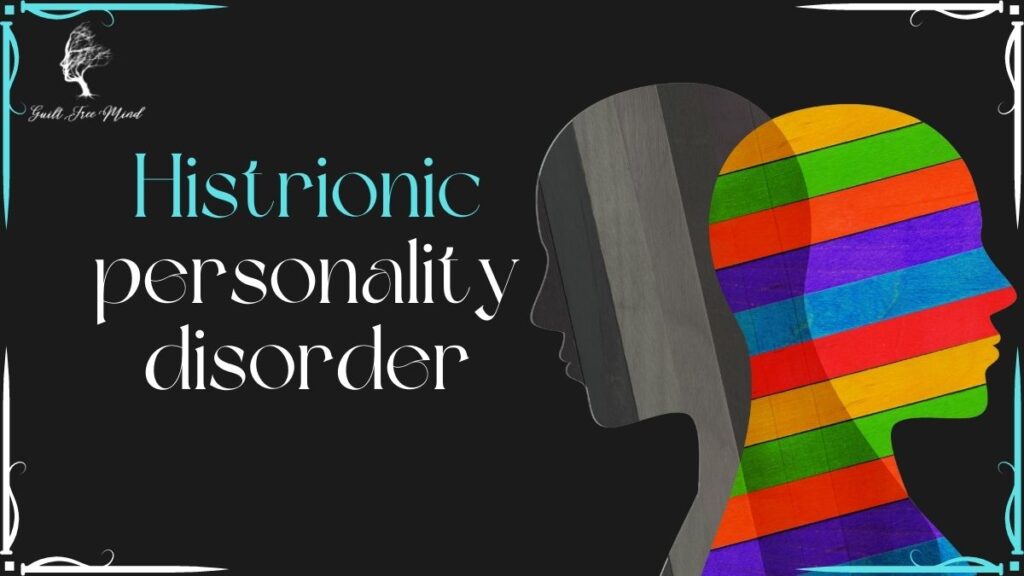You must have come across histrionic personality disorder if you have been watching the news lately. Also referred to as the dramatic personality disorder, this disorder involves extreme levels of attention-seeking and emotional behavior. Do you want to know all the details about histrionic personality disorder? Then you have come to the right place. Keep reading to the end to know each aspect of this personality disorder.
If you want to know more about different personality disorders, psychopathy spectrum, how to deal with anxiety, depression, and finally, how to lead a more fulfilling and mentally healthy lifestyle, subscribe to the Guilt Free Mind. Your subscription will allow me to send you notifications about the release of the latest blog posts so that you stay updated with all the tips and tricks of leading a mindful lifestyle. If you like to watch videos, Guilt Free Mind also has a YouTube channel named Shruti’s art studio. Please subscribe to it and remember to ring the notification bell so that YouTube can notify you about the latest releases.
Table of Contents
What is a personality disorder?
Before I explain what exactly is a personality disorder, you need to understand what is a personality disorder in the first place.
A person is said to have a personality disorder when the said person starts to display maladaptive behavioral and thinking patterns. These thinking and behavioral patterns will cause a significant impairment of the occupational and social functioning of the person. It can also lead to interpersonal distress. Such behavior and thinking patterns are significantly different from society’s accepted as normal. However, these patterns do fall under the diagnostic criteria for the different personality disorders.
Most often, the divergence observed from the normal cultural expectations manifests itself as disturbances in the person’s effectivity, interpersonal functioning, cognition, and impulse control. Such people will either have extremely high regard for themselves or base their self-regard on the appreciation they get from others.
They will display manipulative, narcissistic, and psychopathic tendencies. These behaviors will negatively impact their home and office life. They may also find it difficult to hold down relationships with anyone for very long. Personality disorders often do not arise because the person is suffering from substance abuse or an underlying medical condition. The root of personality disorders most often lies in the childhood of the person, the upbringing, or genetic factors.
Histrionic personality disorder
A histrionic personality disorder is a mental health condition or a psychiatric disorder that is mostly characterized by a pattern of attention-seeking and highly emotional behavior. The word histrionic refers to being overly theatrical or dramatic. This disorder often starts during the early adulthood phases of the person.

A histrionic personality disorder is among the ten personality disorders that are part of the DSM-5. It is a part of the cluster B disorders. Cluster B disorders are normally characterized as personality disorders that involve extremely dramatic, erratic, and overly emotional behavior. Other common disorders that are part of the cluster B personality disorders involve borderline personality disorder, narcissistic personality disorder, and antisocial personality disorder. Around 9% of the population has been observed to have one of these personality disorders. The histrionic personality disorder affects around 2-3% of the population. People with histrionic personality disorder are extremely seductive, manipulative, flirtatious, impulsive, lively, and charming.
The problem with a histrionic personality disorder is that the sufferer has an extremely distorted image of their self. They will tend to base their self-esteem on others approval. Therefore, they try to always be in the good books of others. They will do things to ensure that others put them on a pedestal, and they get a ton of praise. This constant need to be noticed makes such people resort to theatrical behavior and unnecessary dramatics.
Who is more affected by histrionic personality disorder? Men or women?
So far, it has been observed that women are more affected by histrionic personality disorder than men. It may be because men do not tend to report their symptoms while women are generally more vocal. Therefore, the problem is visible in the case of women, while in the case of men, the problem may be there, but it may not be visible on the surface.
Why do people resort to drama in histrionic personality disorder?
People who suffer from histrionic personality disorder often feel disregarded or unappreciated. This especially happens if they are not the party’s life or the center of attention. These people know how to make an appearance and how to behave so that they catch everyone’s eye and become the primary attraction wherever they go. They will present themselves as being extremely vibrant, overly seductive, enchanting, or even inappropriately sexual if that will get them the attention that they want. They can act flirtatiously and display sexual promiscuity even if they do not feel sexually attracted to the other person.
Those who suffer from this personality disorder engage in behavior that rapidly shifts from one emotion to another. Others may feel that such people are insincere and cannot be trusted. Such people will also try to gain attention by wearing revealing garments or bright-colored clothing. They will go for the most expensive item in the showroom to show off their personality.
People diagnosed with histrionic personality disorder try to talk vaguely. This way, they can keep the audience engaged and focused on them. They try to focus too much on emotional expressiveness and become very dramatic when talking to others. Their theatrics most often cause embarrassment to their friends, family, and acquaintances. They are also extremely gullible, impressionable, suggestible, and get very easily influenced by those they admire.
Another huge problem with people suffering from this personality disorder is that they harbor unrealistic grandeurs about their relationships. They may feel that the other person is a lot closer to them. Most often, this is not the truth. Their minds want to believe that their partner cannot function without them.
Origin of the histrionic personality disorder
The explicit causes behind histrionic personality disorders have not yet been diagnosed. However, it is most likely a disorder that has a multifactorial origin. Experts believe that histrionic personality disorder develops due to inherited and learned factors. Therefore, genetics does have a role to play in this disease. There are a few hypotheses that discuss the development of this personality disorder. Let’s have a look.

The first hypothesis states that histrionic personality disorder may develop due to repressed childhood trauma. Most often, it is the coping mechanisms that the child uses that eventually cause the development of personality issues.
A second hypothesis implicates the genetic factors for the development of the disease. Suppose the family has a history of psychiatric illness, personality disorders, and substance abuse. In that case, these predispose the child towards developing a histrionic personality disorder. Since histrionic personality disorder most often runs in families, there is a chance that heredity and genetics have a huge role in developing this mental health issue.
Some psychologists say that the problems present in the parent-child relationship during childhood cause low self-esteem in kids. As these kids grow up, they are more prone to developing histrionic personality disorder compared to others.
Signs and symptoms
As I mentioned before, people who have histrionic personality disorder will yearn to be the life of the party. They will do anything to get attention from anyone and everyone. Therefore, people with such mental health issues have amazing social skills. However, they will not use these social skills to socialize with others. They will instead use these skills to manipulate people so that they are always the center of the attention and the life of any party they go to.
Some other symptoms that people with a histrionic personality disorder may display are:
- Be extremely uncomfortable and fidgety unless they are the center of attention in public.
- Exhibit inappropriate flirtatious or seductive behavior to gain attention.
- Dress provocatively
- Rapidly shifting emotions
- Act extremely dramatically, as if performing in a theater in front of an audience. However, since most of their emotions are shallow, their behavior lacks sincerity.
- Constantly and overly concerned with their physical appearance.
- Constantly look for approval and reassurance.
- Get easily influenced by others.
- Be excessively sensitive towards disapproval or criticism.
- Experts in the art of manipulation
- Kings and Queens of the blame game
- Extremely low tolerance and patience towards any project they start. They will start projects but not bother to finish them before they leave them. Therefore, they prefer to hop from one project to another.
- Not spend any time thinking before they act.
- Experts at rash decision making
- Completely self-centered
- Lacking in empathy
- They have a hard time maintaining their relationships since they often behave extremely shallowly or display fake behavior.
- Attempting suicide or threatening to commit suicide to become the center of attention.
- Think that their relationships are closer than what they are in real life.
- Look for constant gratification.
Diagnosis
Personalities evolve over time. As and when the child progresses from childhood to adulthood, the personality continues to change. This is why psychologists do not diagnose anyone with histrionic personality disorder unless they have crossed 18 years of age.
The primary problem with personality disorders is that people do not feel that they behave differently from others. The affected people most often feel that their behavior is absolutely normal and there is no need to see a psychologist. All personality disorders, including histrionic personality disorder, have become very hard to diagnose.
When such people finally seek help, it is most often because they are suffering from depression or anxiety. Both of these problems occur because of the existing personality disorder. However, such people do not realize that. They will go to the counselor because they had a divorce or had a string of lost relationships but not because their behavior is abnormal.

Role of the psychologist
Suppose the psychologist or psychiatrist suspects that the person is suffering from a histrionic personality disorder. In that case, they will ask the person very general and broad questions. This way, the person will not feel the need to provide a hostile response. Most often, therapists will ask questions that focus on the person’s:
- Past history
- Previous work history
- Impulse control
- Relationships
- Reality testing
There is a high chance that the person suffering from a personality disorder may not be aware of the same. Furthermore, it is not possible to diagnose a personality disorder in one or two sessions since the person may not exhibit the behavior coinciding with the disorder. Under such circumstances, the therapist will ask the person to collect information from their friends and family members.
The final diagnosis of histrionic personality disorder will be made based on the criteria mentioned in the American Psychiatric Association’s diagnostic and statistical manual of mental disorders.
When is psychologist diagnoses a person as suffering from a histrionic personality disorder, the patient fulfills either one or more of the persistent behaviors mentioned below:
- Vague speech forms
- Impressionistic personality
- Exaggerated and dramatic emotions
- Uncomfortable if not the center of the attention or the life of the party
- Constantly flirting with anyone and everyone they come across
- Provocative and seductive behavior
- Putting extra emphasis on the appearance so they can draw attention
- Extremely suggestible and easily influenced
- Feel that relationships are generally more intimate than they are.
- Differential diagnosis of the histrionic personality disorder
- The differential diagnosis for this personality disorder also includes:
- borderline personality disorder
- narcissistic personality disorder
- somatic symptom disorder
- dependent personality disorder
- illness anxiety disorder.
Family and group therapy are not recommended.
For histrionic personality disorder, family and group therapy is not recommended as the first line of treatment. Since such patients love to be the center of focus, being in group therapy or family therapy is not an option since they may not be the focus during the sessions. Furthermore, people who have this disorder exhibit extremely shallow emotions. This makes them appear very insincere during the sessions.
Histrionic patients may also show inappropriate sexual advances toward their therapist. Thus, the therapist must set firm boundaries when dealing with the patients. Assertive and role-play model approaches can help minimize conflicts.
Histrionic personality disorder vs. other personality disorders
Just like histrionic personality disorder, patients who have narcissistic personality disorder also prefer to constantly be in the limelight and be the life of the party. However, suppose a person is suffering from a narcissistic personality disorder. In that case, they will look for attention that arises from awe and admiration. People with a histrionic personality disorder do not care about the type of attention they receive. They only want attention.
However, there is one difference between borderline personality disorder and histrionic personality disorder. Patients with borderline personality disorders tend to dislike their own selves. However, this is not the case with a histrionic personality disorder. Those diagnosed with histrionic personality disorder display behavior similar to borderline personality disorder because both of these patient types experience emotions intensely.
The dependent personality disorder is slightly different from a histrionic personality disorder because the person will behave submissively in a dependent personality disorder. Their behavior will be more inhibited since they are always preoccupied with a fear of rejection from the other person. What is common between histrionic personality disorder and dependent personality disorder is that both these people love to be around other people.
Patients suffering from histrionic personality disorder tend to use physical symptoms and bodily complaints to grab attention. Bodily complaints and physical symptoms are also a part of the illness anxiety disorder and the somatic symptom disorder. Patients with somatic symptom disorder or illness anxiety disorder are also a part of the differential diagnosis.
Treatment
Psychologists have one treatment of choice when it comes to histrionic personality disorder. This is psychotherapy. Psychologists most often use supportive psychotherapy for patients with Histrionic personality disorder. This approach is non-threatening, reassuring, and encouraging. Once the patient has been diagnosed with histrionic personality disorder, the therapist must make it clear to the patient that there is no cure for this condition. However, there are ways that can help the patient control the symptoms. The primary focus of supportive psychotherapy is to reduce the patient’s emotional distress. The therapy’s focus is on improving the self-esteem of the patient and boosting the coping skills. Sympathetic and attentive listening are used to help the patient navigate through the treatment process.

Insight-oriented therapy or psychodynamic psychotherapy has also been used to treat patients with histrionic personality disorder. The goal of psychodynamic psychotherapy is to alter the patient’s dysfunctional personality by use of developmental personality milestones. These milestones are the ones that the patient missed during their emotional maturation.
Psychodynamic psychotherapy also focuses on resolving all the unconscious and underlying conflicts that the patient may have. This will help the patient understand their own behavior and self in a better manner. Furthermore, the psychologist will work with the patient to use adaptive behavior or action instead of excessively dramatic speech styles when communicating with anyone.
With the use of psychodynamic psychotherapy, patients understand and start to recognize their own attention-seeking and hypersexual behaviors. They also realize that these behaviors are maladaptive and need change. Eventually, they work on developing healthier ways to boost their self-esteem.
Medications
Even though the gold standard treatment for histrionic personality disorder is most often psychotherapy, the patients may exhibit symptomatic symptoms. Some of these symptomatic symptoms include
- Excessive mood swings
- Cheerfulness
- Anger
- Depression
- Anxiety
Currently, there are no FDA-approved medications to treat this personality disorder. The symptomatic behaviors may be treated by the use of mood stabilizers, antidepressants, and antipsychotics. The mood stabilizers can specifically help with behavior regulation and impulse control.
When treating histrionic personality disorder, the medications should be allowed longer trial periods to identify if the medication is effective or not. If there is a premature termination of the medication, it will not allow for adequate trial duration. Just because the person had an alteration in emotional crisis or mood, medication should not be changed.
Holistic modes of treatment
There are certain holistic modes of treatment that can be employed to help patients with a histrionic personality disorder. These treatments include yoga, biofeedback, mindfulness techniques, and Tai chi. These help patients establish control over their emotional reactivity and impulsivity.
Coping mechanism
Unfortunately, in most cases, histrionic personality disorder goes untreated and undiagnosed. Thus, the best way to help a person suffering from this mental health issue is to identify the symptoms. The appropriate treatment can help the patient manage the symptoms. The patient can also work with the therapist to decide on a self-care plan that would improve the patient’s quality of life. This self-care plan includes:
- Establishing a consistent sleeping and eating schedule
- Regular exercises
- Avoiding alcohol and drugs completely
- Enlisting and getting help from family members and trusted friends to keep the patient on track.
Associated complications
Unfortunately, people who suffer from histrionic personality disorder have a higher chance of developing depression than others. As I mentioned before, this is because they cannot have a stable relationship due to their personality problems. They are also at high risk of developing substance abuse disorders like alcohol or cannabis use.
Patients suffering from histrionic personality disorder are more inclined towards suffering from panic attacks, somatization disorder, conversion disorders, etc. Such people will resort to using suicidal threats and gestures to get themselves noticed. They will go to any lengths to get the attention they want. In other words, there is no limit when a person is suffering from a histrionic personality disorder.

Living with a person having a histrionic personality disorder
If you notice that your friend or family member is showing signs of histrionic personality disorder, please do not start self-medication. Encourage the person to get help. A histrionic personality disorder is practically impossible to deal with without psychotherapy. Thus, urge your loved one to get help. Find out resources about these personality disorders, including treatment options and understanding the symptoms. This way, you can adapt to support the person with the problem.
Long term outcome
Most people who suffer from histrionic personality disorder lead a normal life. They work and are a regular part of society. Due to their need to be the party’s life and the center of attention, such people do extremely well in social settings. The primary section where they encounter problems is in their intimate relationships. However, this depends on the severity of the histrionic personality disorder.
Suppose the person is diagnosed with severe histrionic personality disorder. In that case, they may find it hard to maintain a relationship, hold a job or even focus on their life goals. This absence of fulfillment forces such people to seek out adventure sports. Thus, they constantly put themselves in risky situations.
Since histrionic disorder can affect how a person handles loss and failure, such people are also at a higher risk of developing depression. If you are looking to lead a fulfilling and happy life, you must discuss the symptoms that you or your loved ones are feeling with your mental health care provider. If your loved one shows signs of personality disorder, the best option for you is to note down all the person’s symptoms. This will help the counselor diagnose the problem quicker.
Conclusion
Histrionic personality disorder has its origin roots in childhood trauma, improper upbringing modes, and genetic factors. Most often, the people who suffer from histrionic personality disorder do not realize that they have a mental health issue. This makes the disorder very hard to diagnose. Furthermore, the similarities that histrionic personality disorder shares with other personality disorders make it challenging to differentiate whether the person is suffering from histrionic or other personality disorders. Therefore, you mustn’t conduct a self-diagnosis. If you suspect that you or any of your loved ones are facing a personality disorder, urge them to go to a psychologist.
If you have found this blog post insightful and would like to know more actionable tips regarding mental health, please subscribe to the Guilt Free Mind. This will help me send you notifications about the release of new blog posts so that you never miss out on any important tips. If you like watching videos, please subscribe to the YouTube channel of Guilt Free Mind, Shruti’s Art Studio.

What do you think about histrionic personality disorder? Have you ever come across a loved one who might be displaying such signs? Please leave your opinions and comments in the comment section below. Your life experiences can help someone lead a better and more fulfilling life. If you have any queries about this particular blog post or any others on the Guilt Free Mind, please reach out to me on any of my social media channels. You can also leave your questions in the comments section. I will be happy to help.
Frequently Asked Questions
Yes! Histrionic personality disorder is a very real psychological disorder. it is characterized by the person’s need to behave in an excessively dramatic manner to always be the center of attention.
Unfortunately, there is no cure for histrionic personality disorder. However, the specific symptoms of HPD can be controlled via use of medications, holistic approaches, mindfulness techniques, etc.
Histrionic personality disorder is a mental health condition or a psychiatric disorder that is mostly characterized by a pattern of attention-seeking and highly emotional behavior.

2 Comments
I have to thank you for the efforts youve put in penning this site. Im hoping to view the same high-grade blog posts by you later on as well. In fact, your creative writing abilities has encouraged me to get my very own website now 😉
My sister has NPD and HPD. We are No Contact. She ruins lives. She thought my attempt on my life was about me being jealous of her! Hilarious.